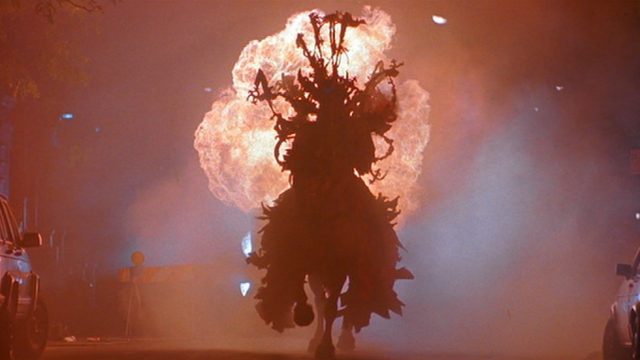Confronted with writing about a movie like Terry Gilliam’s The Fisher King, I become painfully aware of my privileged place in life. This is a movie, pitched as a fairy tale, that’s playing with the dual loaded guns of homelessness and mental illness; my own struggles with depression, anxiety, and PTSD notwithstanding, I don’t entirely feel adequate to comment on the issues it raises. As a result, while I will try to defend this movie, I understand it has a lot of issues and that my own place in life may have blinded me to some of the nuances of this experience.
On paper, the film seems embarrassingly facile: Jack, a shock jock (Jeff Bridges, in a performance that’s among his pre-Dude best) who was fired after an offhand remark to a listener inspires him to go on a shooting spree, runs into a homeless man, Parry (Robin Williams), whose life fell apart when the shooter killed his wife. Jack feels guilty for his role in Parry’s tragedy and tries to help him find love. Parry thinks Jack is there to help him find the Holy Grail, which he believes is in a castle-like building on Fifth Avenue. Of everything in The Fisher King, Richard LaGravanese’s Oscar-nominated screenplay has aged the worst. It’s maudlin and saccharine in ways that make it difficult to defend against charges that this movie doesn’t give mental illness and homelessness the proper weight.
Thankfully, the direction and performances mostly save the film from the script’s pitfalls. It’s one thing to try to write a modern-day fairy tale, it’s another to visualize it, and Gilliam is an inspired choice for director. In the middle of a hot streak that wouldn’t end until after 1997’s 12 Monkeys, Gilliam’s surreal style is perfectly suited to the content, taking the raw material of Manhattan and finding ways to make it both magical and terrifying. Gilliam’s command of his craft is on full display in the opening moments of the movie, where Jack’s minimalist DJ both somehow feels both cavernous and claustrophobic, like he’s caught in a cage while thinking he’s free. In the film’s most famous moment, Parry follows Lydia, the shy publishing agent he loves, through Grand Central Station, both unaware of the choreographed waltz that has broken out around them. And in the best visual decision Gilliam made in the movie, when guilt over “replacing” his wife with Lydia triggers a mental breakdown, we get flashbacks to the night his wife died, with no graphic detail spared. It’s horrifying and throws Williams’s manic performance into relief.
Indeed, the performances remain the highlight of the movie. At first, it feels like Williams is leaning too hard on his usual schtick, entering the movie talking about bowel movements and little people. But his performance grows in power as the movie goes on, building to a simple, quietly asked question that’s all the more heartbreaking for how simply it’s phrased and how subtly it’s played. Bridges is even better. More than perhaps anyone else in the cast, he’s tasked with making us believe the sorts of moments that only happen in movies, and he nails every one. He remains an asshole for 90% of the runtime but is never less than compelling. Plummer has perhaps the most difficult role, playing an object of desire so painfully shy that she takes Parry’s admission of stalking as the grand romantic gesture the movie so desperately wants it to be, but somehow she makes it work. And Mercedes Ruehl deservedly won an Oscar for her solid, unshowy performance as Jack’s girlfriend, exerting a Herculean effort to get him out of the deep funk he’s been in for years. But perhaps the two most crucial performances belong to Tom Waits as a paraplegic veteran who knows all too well what he represents to passersby and Michael Jeter (the movie’s MVP) as a homeless cabaret singer. The two provide the empathy that the film needs. For all the big emotional moments the movie pushes, almost none match the power of Jeter matter-of-factly describing watching all his friends die (from what’s implied to be AIDS) and then sobbing how his dad must be so proud of him.
As much as The Fisher King has suffered from society’s growing understanding of homelessness and mental illness in the years since its release, it’s also benefitted from the fact that Hollywood in general, and filmmakers of Gilliam’s stature in particular, so rarely make these kinds of movies anymore. Urban fairy tales for grown-ups have had an ignominious legacy within the past decade, with the only major examples being detritus like Collateral Beauty and Winter’s Tale. With movies like those, it’s become easier to appreciate something as well-crafted as The Fisher King. And while it might be a little superficial in its treatment of homelessness and mental illness, it’s never hateful.


